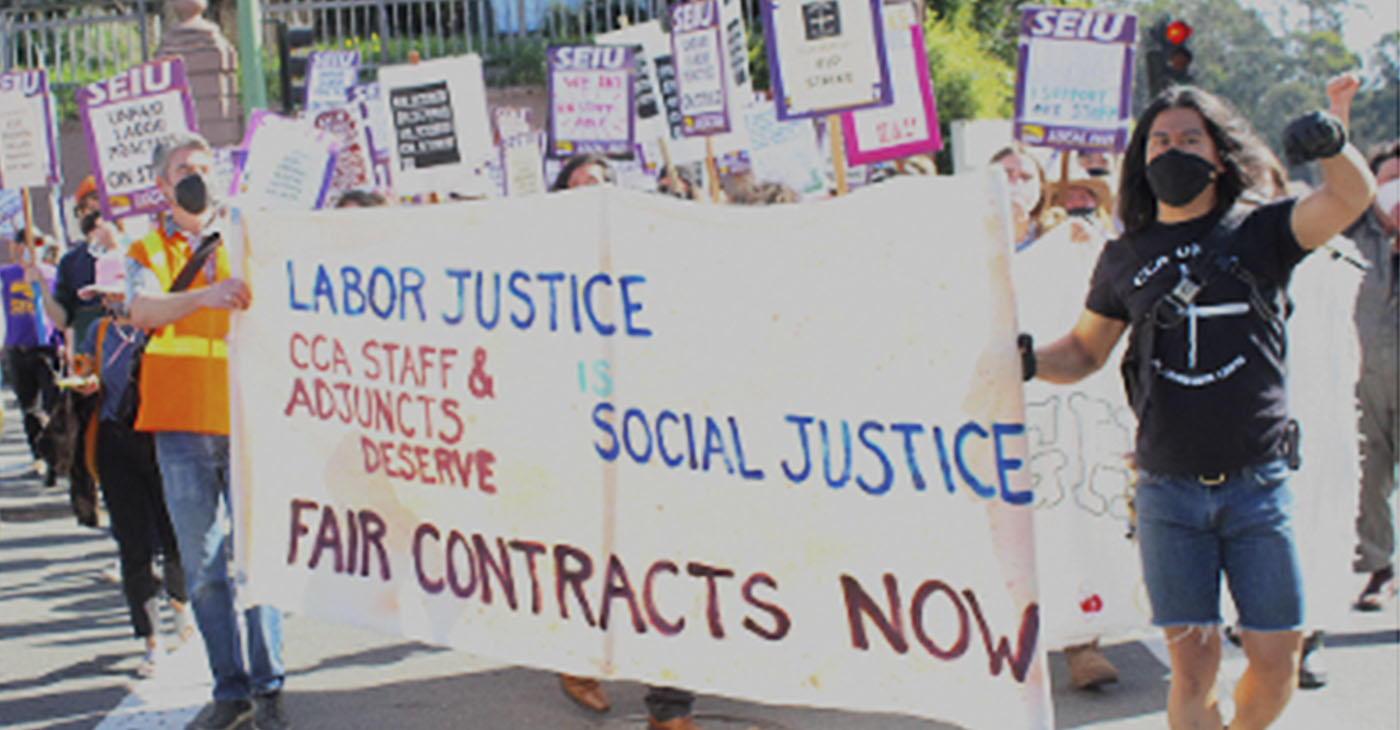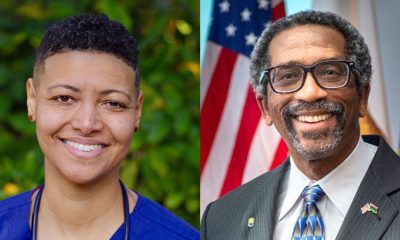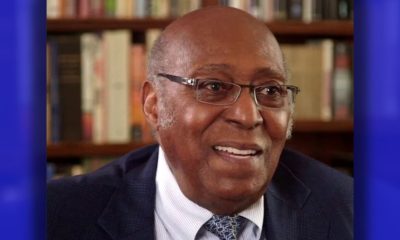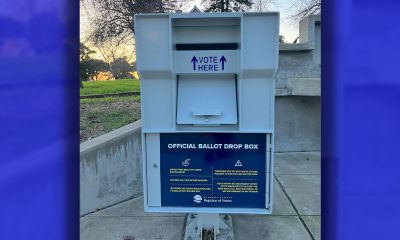Activism
California College of the Arts Staff Union Strikes, Citing Unfair Labor Practices
Members of the California College of the Arts staff union point to salaries at the administrative level, which they see as excessively high, and question why the school isn’t paying their lower wage workers more. The school’s 2020 990 filing shows four administrators made well over $270,000 in 2019. President Stephen Beal made a base salary of more than $580,000 while working 37.5 hours per week. Such a salary is over $150,000 more than both the current Mayor of San Francisco and the President of the United States. The 990 also estimates Beal made over $100,000 in addition to his base salary in “other compensation from the organization and related organizations.”

By Zack Haber
The staff union at California College of the Arts (CCA), a small, private college founded in 1907, engaged in a four-day strike and protest. They’re accusing the school of unfair labor practices that include stalling contract negotiations in an effort to withhold pay increases and benefits.
“We have a unionized workplace now,” said SEIU 1021 chapter President Matt Kennedy, who’s worked in the tech department of the college for 10 years. “CCA needs to acknowledge that. It’s taking forever to come to an agreement because they aren’t.”
The protests featured rallies, teach-ins, group art-making projects and daily pickets that started February 8 and end on February 12. The actions are taking place on the school’s San Francisco campus every day except Wednesday, when the protest moved to the school’s Oakland campus. Around 200 people, including union members and their supporters, showed up each day to the pickets.
In interviews with this reporter, Kennedy, along with three other current or former workers at CCA, all accused the school of bargaining in bad faith.
“CCA has been stonewalling and dragging their feet,” said Kēhau Lyons, an academic advisor who’s worked at CCA for about two and a half years and has been observing the bargaining sessions. “The management side just doesn’t want to get this completed.”
CCA’s staff successfully voted to unionize with SEIU 1021 in April of 2019. Since then, staff members say they have not received any raises outside of those required by law. While contract negotiations started in October of 2019, CCA’s staff is still working without a union contract. A study by Bloomberg Law based on National Labor Relations Board data shows that, between 2004 and the first half of 2021, the average amount of time it took employers and unions to agree on a first contract was a little over one year and one month. The union and CCA’s negotiations have, thus far, taken over two years and four months.
In an email, CCA Director of Communications Daniel Owens-Hill, disagreed with staff who accused the college of stalling negotiations.
“CCA remains ready and willing to negotiate as frequently as needed to achieve a fair and mutually beneficial collective bargaining agreement,” Owens-Hill wrote. “The college has a comprehensive proposal on the table that provides wage increases for our valued staff while also maintaining our ongoing commitment to student financial aid and a financially sustainable future.”
On September 27 of last year, National Labor Relations Board Regional Director Valerie Hardy-Mahoney sided with the union by issuing a Complaint and Notice of Hearing stating that CCA had “been failing and refusing to bargain collectively and in good faith with the union.” In that same document, she also proposed new bargaining guidelines for the college to follow going forward.
CCA is currently offering a 2% wage increase to all staff in the union. Workers interviewed for this article see that raise as inadequate and stressed that their most important request while bargaining has been “raising the floor” for staff salaries. To pay the expenses needed to live in the Bay Area, staff said, they want a minimum wage of $55,000. Kennedy said salary records show 40% of CCA staff makes less than $55,000 per year, and 10% make between $36,000 and $45,000. For many workers, the 2% increase would fall short of providing the minimum salary.
CCA workers point to salaries at the administrative level, which they see as excessively high, and question why the school isn’t paying their lower wage workers more. The school’s 2020 990 filing shows four administrators made well over $270,000 in 2019. President Stephen Beal made a base salary of more than $580,000 while working 37.5 hours per week. Such a salary is over $150,000 more than both the current Mayor of San Francisco and the President of the United States. The 990 also estimates Beal made over $100,000 in addition to his base salary in “other compensation from the organization and related organizations.”
In April of 2020, Beal’s base salary was cut by 25%, while the senior vice president’s was cut by 10%, and the vice president’s was cut by 5%.
CCA staff union members say they have noticed a high employment turnover rate which they attribute to their co-workers not receiving high enough pay. Emails from CCA’s Human Resources Department show that, since August, 19 staff union members have stopped working at the school, which is about 15% of the total union staff.
Randy Nakamura has taught as an adjunct at CCA’s graduate design program for the last six years, and is also part of CCA’s adjunct union’s bargaining unit. CCA’s adjunct union is separate from the staff union, but Nakamura and other adjuncts are also trying to reach a contract with CCA.
Nakamura says that since the CCA adjunct union contract expired in June of 2020, he and his fellow union members’ experiences bargaining to renew their contract have been similar to the staff union’s efforts to get CCA to agree to a first contract.
“CCA has taken every opportunity to not bargain with us,” said Nakamura. “Sometimes they’ll make us wait an hour and a half in a three-hour bargaining session just to talk.”
After a year and a half of bargaining, the adjunct union has not yet been able to renew its contract with CCA. Seeing themselves in a similar struggle as the staff union, over 100 CCA’s adjunct union member supported CCA’s staff union by sympathy striking, and not teaching classes during the strike.
Some adjuncts also joined staff on the picket line. Additionally, members of the CCA Student Union and some other CCA students who sympathize with the staff strike criticized CCA’s 2% wage increase offer as too low and picketed and did not attending classes to show their support.
“The staff and adjunct’s working conditions are student learning conditions,” the CCA Student Union wrote on a recent instagram post. “We as students completely benefit from union bargaining and a fair contract for our beloved staff.”
CCA faculty who are tenured or on tenure track are not part of the staff union and have separate independent contracts. But they also showed support.
“We are not willing to cross the picket line,” reads a support letter released on February 7 that 99 such faculty members signed. “[We] will instead find ways to express peaceful solidarity during the strike, including engaging in strike-related teach-ins and pedagogical activities.”
Through their spokesperson, David Owens-Hill, CCA criticized the strike.
“At a time when we are making rapid progress in negotiations and have reached agreement on so many items, a strike benefits no one,” wrote Owens-Hill in an email, “not our staff, not our faculty, and certainly not our students, who have just returned to fully in-person classes for the first time in nearly two years.”
CCA staff union members disagree with Owens-Hill.
“It’s important to show in our strike that CCA can’t get away with this,” said SEIU’s Kennedy. “Better working conditions and compensation make better learning conditions, and the college needs to make that a priority. But they’re not.”
Activism
Oakland Post: Week of April 17 – 23, 2024
The printed Weekly Edition of the Oakland Post: Week of April 17 – 23, 2024

To enlarge your view of this issue, use the slider, magnifying glass icon or full page icon in the lower right corner of the browser window. ![]()
Activism
Oakland Schools Honor Fred Korematsu Day of Civil Liberties
Every Jan. 30, OUSD commemorates the legacy of Fred Korematsu, an Oakland native, a Castlemont High School graduate, and a national symbol of resistance, resilience, and justice. His defiant stand against racial injustice and his unwavering commitment to civil rights continue to inspire the local community and the nation. Tuesday was “Fred Korematsu Day of Civil Liberties and the Constitution” in the state of California and a growing number of states across the country.

By Post Staff
Every Jan. 30, OUSD commemorates the legacy of Fred Korematsu, an Oakland native, a Castlemont High School graduate, and a national symbol of resistance, resilience, and justice.
His defiant stand against racial injustice and his unwavering commitment to civil rights continue to inspire the local community and the nation. Tuesday was “Fred Korematsu Day of Civil Liberties and the Constitution” in the state of California and a growing number of states across the country.
One OUSD school is named in his honor: Fred T. Korematsu Discovery Academy (KDA) elementary in East Oakland.
Several years ago, founding KDA Principal Charles Wilson, in a video interview with anti-hate organization “Not In Our Town,” said, “We chose the name Fred Korematsu because we really felt like the attributes that he showed in his work are things that the children need to learn … that common people can stand up and make differences in a large number of people’s lives.”
Fred Korematsu was born in Oakland on Jan. 30, 1919. His parents ran a floral nursery business, and his upbringing in Oakland shaped his worldview. His belief in the importance of standing up for your rights and the rights of others, regardless of race or background, was the foundation for his activism against racial prejudice and for the rights of Japanese Americans during World War II.
At the start of the war, Korematsu was turned away from enlisting in the National Guard and the Coast Guard because of his race. He trained as a welder, working at the docks in Oakland, but was fired after the bombing of Pearl Harbor in 1941. Fear and prejudice led to federal Executive Order 9066, which forced more than 120,000 Japanese Americans out of their homes and neighborhoods and into remote internment camps.
The 23-year-old Korematsu resisted the order. He underwent cosmetic surgery and assumed a false identity, choosing freedom over unjust imprisonment. His later arrest and conviction sparked a legal battle that would challenge the foundation of civil liberties in America.
Korematsu’s fight culminated in the Supreme Court’s initial ruling against him in 1944. He spent years in a Utah internment camp with his family, followed by time living in Salt Lake City where he was dogged by racism.
In 1976, President Gerald Ford overturned Executive Order 9066. Seven years later, the 9th Circuit Court of Appeals in San Francisco vacated Korematsu’s conviction. He said in court, “I would like to see the government admit that they were wrong and do something about it so this will never happen again to any American citizen of any race, creed, or color.”
Korematsu’s dedication and determination established him as a national icon of civil rights and social justice. He advocated for justice with Rosa Parks. In 1998, President Bill Clinton gave him the Presidential Medal of Freedom saying, “In the long history of our country’s constant search for justice, some names of ordinary citizens stand for millions of souls … To that distinguished list, today we add the name of Fred Korematsu.”
After Sept. 11, 2001, Korematsu spoke out against hatred and discrimination, saying what happened to Japanese Americans should not happen to people of Middle Eastern descent.
Korematsu’s roots in Oakland and his education in OUSD are a source of great pride for the city, according to the school district. His most famous quote, which is on the Korematsu elementary school mural, is as relevant now as ever, “If you have the feeling that something is wrong, don’t be afraid to speak up.”
Activism
WOMEN IMPACTING THE CHURCH AND COMMUNITY
Juanita Matthews, better known as “Sister Teacher,” is a walking Bible scholar. She moved to California from the great state of Arkansas in 1971. Sister Teacher has a passion for teaching. She has been a member of Bible Fellowship Missionary Baptist Church since 1971.

Sister Juanita Matthews
55 Years with Oakland Public School District
The Teacher, Mother, Community Outreach Champion, And Child of God
Juanita Matthews, better known as “Sister Teacher,” is a walking Bible scholar. She moved to California from the great state of Arkansas in 1971. Sister Teacher has a passion for teaching. She has been a member of Bible Fellowship Missionary Baptist Church since 1971. She followed her passion for teaching, and in 1977 became the lead teacher for Adult Class #6. Her motto still today is “Once My Student, Always My Student”.
Beyond her remarkable love for the Lord, Sister Teacher has showcased her love for teaching by working for the Oakland Unified School District for 55 years, all but four of those years spent at Emerson Elementary and Child Development School. She truly cares about her students, making sure they have the tools/supplies needed to learn either at OUSD or Bible Fellowship Missionary Baptist Church.
She’s also had a “Clothes Closet Ministry” for 51 years, making sure her students have sufficient clothing for school. The Clothes Closet Ministry extends past her students, she has been clothing the community for over 50 years as well. She loves the Lord and is a servant on a mission. She is a loving mother to two beautiful children, Sandra and Andre. This is the impact this woman of God has on her church and the community.
-

 Activism4 weeks ago
Activism4 weeks agoOakland Post: Week of March 27 – April 2, 2024
-

 #NNPA BlackPress4 weeks ago
#NNPA BlackPress4 weeks agoCOMMENTARY: D.C. Crime Bill Fails to Address Root Causes of Violence and Incarceration
-

 #NNPA BlackPress4 weeks ago
#NNPA BlackPress4 weeks agoFrom Raids to Revelations: The Dark Turn in Sean ‘Diddy’ Combs’ Saga
-

 #NNPA BlackPress4 weeks ago
#NNPA BlackPress4 weeks agoCOMMENTARY: Lady Day and The Lights!
-

 #NNPA BlackPress4 weeks ago
#NNPA BlackPress4 weeks agoMayor, City Council President React to May 31 Closing of Birmingham-Southern College
-

 #NNPA BlackPress4 weeks ago
#NNPA BlackPress4 weeks agoBaltimore Key Bridge Catastrophe: A City’s Heartbreak and a Nation’s Alarm
-

 #NNPA BlackPress4 weeks ago
#NNPA BlackPress4 weeks agoBaltimore’s Key Bridge Struck by Ship, Collapses into Water
-

 #NNPA BlackPress4 weeks ago
#NNPA BlackPress4 weeks agoBeloved Actor and Activist Louis Cameron Gossett Jr. Dies at 87





















































